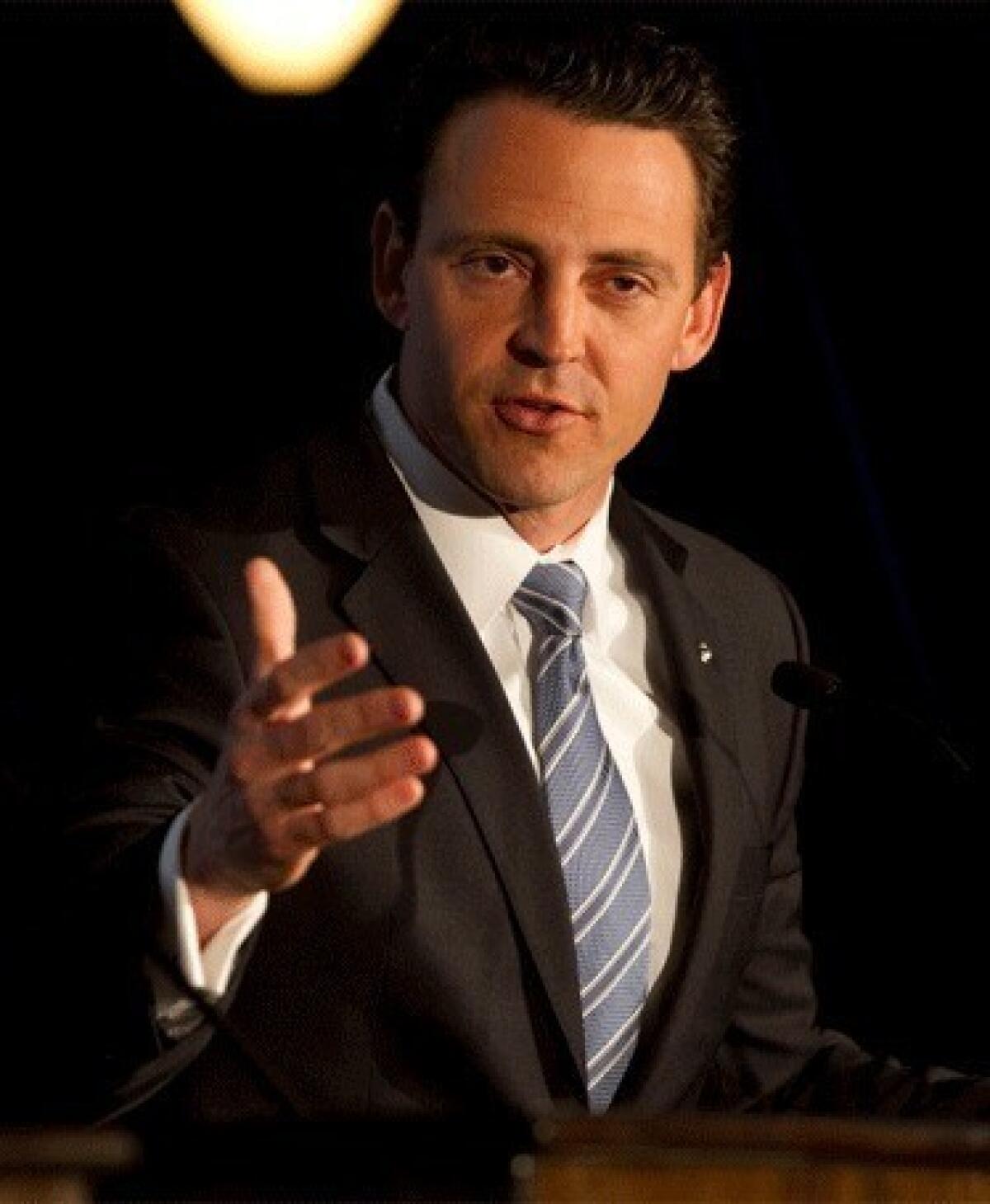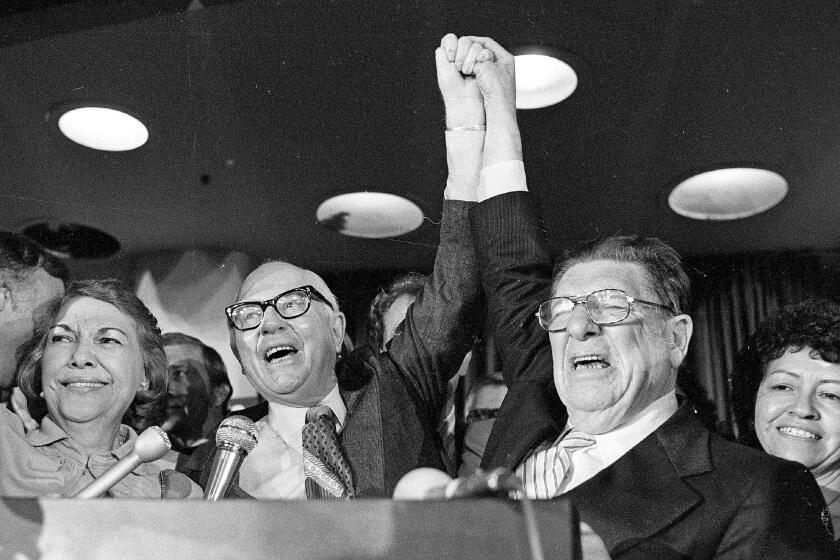Nathan Fletcher, San Diego’s renegade ex-Republican

- Share via
A computer programmed to design a promising young Republican politician would probably spit out Nathan Fletcher. Marine; Iraq combat veteran in Iraq; smart; athletic; married to a well-situated Republican; two little boys, adopted; two dogs, ditto. Perfect — except now there’s no “R” after his name. Fletcher was elected to the state Assembly from San Diego County in 2008, and he is running for San Diego mayor in a nonpartisan race that is nonetheless drawing partisan lightning. Since Fletcher changed his party registration to “decline to state,” which got national coverage, polls have him second in the June 5 primary, just behind openly gay Republican council member Carl DeMaio, who won the GOP endorsement over Fletcher. His critics say his party switch is politically calculated; Fletcher says it’s just about getting the job done.
How did your former GOP colleagues react to your announcement?
My colleagues have actually been pretty great. They’ve said, “Look, you’ve always been an independent voice,” and those who were with me held with me. I have [heard] a fair amount of disappointment from people who said, “Hey, I think you’re the future of the party and it’s kind of sad to see you go.” You never want to disappoint someone, but no one’s really questioned why I did it.
What about former governor and San Diego mayor Pete Wilson? You once worked for him and he has supported you for mayor.
His public comment reflected his private comment, which is he wished I hadn’t done it. He would have preferred me to stay in the party and try to change it from within. But he respects the decision and still supports me.
The San Diego mayor’s race isn’t partisan.
But this race unfortunately has become increasingly partisan, and that helped precipitate [my decision]. I was watching what is supposed to be a nonpartisan race get hijacked by the extremists in each party.
You didn’t get the GOP endorsements. Would you have switched your registration if you had?
Who knows? We could play a never-ending game of hypotheticals. This is something I’ve struggled with for a long time. You can only be told so many times that to have successful politics you have to learn how to play the game before it suddenly clicks: My goal in life is not successful partisan politics. My goal is to do good things.
Sacramento wasn’t always like that.
Yes, I’ve talked to some of the old legislators.
There are always [partisan] differences, and there should be differences. But there also has to be a recognition that we actually have to put teachers in the classroom and we actually have to build bridges. The level of personal vitriol is [now] so much higher. The notion that we may disagree but we still respect each other’s positions appears to have eroded.
I think part of it’ll change with open primaries, which I fully supported [and] took tremendous grief from the party over. Redistricting, where you only had safe seats, combined with term limits, where people didn’t build these relationships with each other — I think those factors all combined.
Tip O’Neill [said] all politics is local. I’d say all politics is personal. It’s those relationships you build. If your kids have played together and you’ve gone to dinner together, you see them in a different light. You don’t see them as the enemy. You have a willingness to sit down and say, how can we figure this out?
In the novel “Atlas Shrugged,” someone asks a character whether he’s the last of the advocates of reason, and he says, “Or the first of their return.” Are you the last of the moderate Republicans, or the first of their return?
History will tell. I don’t know. I’m not on a quest to create an independent party that’s going to nominate a president. For San Diego, it’s what’s needed to move our city forward. I hope it has an impact on others who want to do what I did. If I have [electoral] success, they will feel more emboldened to follow their conscience, because right now there’s a real fear and reluctance to ever break from the party, to ever have a negative score card.
San Diego County’s GOP chairman excoriated you for political pandering, saying your running as an independent is about as credible as Rick Santorum running on the Green Party ticket.
On a number of [issues] I took tremendous grief, but I did what I thought was right. Take “don’t ask, don’t tell.” I had fought in a war. I had been in combat. I didn’t think that policy made sense. Part of being a Marine says “honor, courage and commitment.” We’re asking you to buy into a set of core values, including honor. But then we have a policy asking you not to admit who you are. They’re incompatible. OK, that’s going to get me in trouble with the party, with some socially conservative groups. I can’t go against what I believe is right. Party loyalty often demands that, and I’m not willing to do that.
How did your time in service shape your politics?
If I hadn’t gone to war and I’d just run for office, maybe I would feel more traditional. I just know my threshold for these kinds of silly things we do is pretty low. Someone says you can’t do that because the party insider says so, and I’m like, yeah, I’m not going to lose any sleep over that. In the Marine Corps, you’re given a mission, you just get it done. When you bring that into politics, like the tax reform Gov. Brown and I [tried], you just keep going and get it done.
Didn’t you take the “no new taxes, ever” Republican pledge?
I did. I don’t believe that you build a better economy by raising taxes, but I do believe we can have rational conversations like I did with Gov. Brown.
Will you stick to that pledge? I’m sure a lot of Democrats are thinking, hey, Nathan Fletcher’s our new best friend.
I don’t support the governor’s [ballot initiative tax] plan. I don’t think it solves the long-term problems. But as I demonstrated, I’m willing to work on bigger, broader issues [of] the tax code.
One GOP strategist said you’ve now essentially taken yourself off the list to run for Congress or Senate.
Probably. But a lot of people have ascribed a lot of ambitions on me I’ve never aspired to myself. I really want to be a mayor. I think it’s a job I’m well suited for. San Diego — we have amazing potential. We’ve had an awful decade. We were cast as “Enron by the Sea.” I believe we can enter a rebuilding phase.
You worked for a time for former Rep. Randy Cunningham, who went to prison for bribery.
I was in the office a few months before I went to Iraq and to Africa. It was a very short stint before any of his problems erupted. I didn’t know him; I’d only been around him a handful of times.
Your wife, Mindy Tucker, worked for George W. Bush and Gov. Arnold Schwarzenegger. She too became a decline-to-state voter. Was it a mutual epiphany?
We’ve lived through my time in the Legislature. She cites the tax deal with Gov. Brown: We were going to cut taxes on Californians in exchange for closing a loophole [the loophole benefited out-of-state corporations], taking that money to provide relief for small businesses, trying to keep middle-class jobs. When we got hit really hard on that, she was, “What have both parties come to?” We reflected on it a lot. We both kind of got there together.
When I told one colleague who I was interviewing, he said, “Oh, Nathan Fletcher, the famous surfer!” That’s not you.
I am a surfer, but if you watch me surf, you’ll realize I’m not him. I got invited to go surf with the Wounded Warriors program in San Diego. I show up and this guy with one leg — I think he was a Marine — said, “Who are you?” I said, “Nathan Fletcher,” and he said, “I have a picture of Nathan Fletcher, and you’re not him.”
I said, “I’m the assemblyman running for mayor,” and he said, “A politician? I climbed all the way out of my house on one freaking leg to surf with a politician?”
He was fine, but it was pretty funny.
This interview was edited and excerpted from a longer taped transcript. An archive of Morrison’s interviews is online at latimes.com/pattasks.
More to Read
A cure for the common opinion
Get thought-provoking perspectives with our weekly newsletter.
You may occasionally receive promotional content from the Los Angeles Times.











